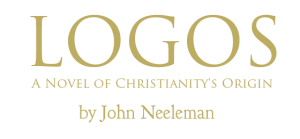Logos is now available worldwide.
Publisher-directAmazonB&N Read the First Chapter
About the Book
While novels and cinema have repeatedly sought after the historical Jesus, until now none have explored what may be a more tantalizing mystery—the Christian story’s anonymous creator. Logos is a literary bildungsroman about the man who will become the anonymous author of the original Gospel, set amid the kaleidoscopic mingling of ancient cultures. Logos is a gripping tale of adventure, a moving love story, and a novel of ideas. None of this should be regarded as out of place or incompatible in a novel about Christianity’s origin. Dissent, anarchism, and revolution—and incipient Christianity was no less these things than the Bolshevik, the French or the American revolutions—inevitably have involved ideas, adventure, and romance.
In A.D. 66, Jacob is an educated and privileged Greco-Roman Jew, a Temple priest in Jerusalem, and a leader of Israel’s rebellion against Rome. When Roman soldiers murder his parents and his beloved sister disappears in a pogrom led by the Roman procurator, personal tragedy impels Jacob to seek blood and vengeance. The rebellion he helps to foment leads to more tragedy, personal and ultimately cosmic: his wife and son perish in the Romans’ siege of Jerusalem, and the Roman army destroys Jerusalem and the Temple, and finally extinguishes Israel at Masada. Jacob is expelled from his homeland, and he wanders by land and sea, bereft of all, until he arrives in Rome. He is still rebellious, and in Rome he joins other dissidents, but now plotting ironic vengeance, not by arms, but by the power of an idea.
Paul of Tarsus, Josephus, the keepers of the Dead Sea Scrolls, and even Yeshua, the historical Jesus himself, play a role in Jacob’s tumultuous and mysterious fortunes. But it is the women who have loved him who help him to appreciate that violence is a dire cycle.
Advance Praise for Logos
“A fictional account of the birth of Christianity.
“First-time author Neeleman has pulled off a staggeringly impressive feat: a rigorously researched historical novel that carries its scholarliness lightly and grips the reader with personal drama. Jacob was raised to be an intellectual, reading both Greek and Latin, as well as Hebrew and Aramaic, but also to love his native Jerusalem. He chafes under the oppressive, sometimes-capricious rule of the Roman Empire, however, despite the security such tyranny brings to the Jewish people. Still, he clings to his family, reluctant to endanger them and the quiet life he enjoys. After a ferocious massacre leaves his parents and sister murdered, Jacob’s desire for revolution and the autonomy of Jerusalem grows, plunging him into a war for liberty. Neeleman depicts the ensuing drama with a powerful prose that evokes the spirit of the time without devolving into historically archaic vernacular: “Beyond the gates were ranks of torch carrying soldiers marching two abreast, man after man in gleaming helmet; they formed a bristling, seething, shining, gigantic serpent. He heard the tramp of a hundred thousand armor-clad feet and the serpent’s awful roaring, joyful in its bloody work: victorious, violent, unbridled.” Despite its theological content, the story brims with sensual imagery. Overcoming his original antipathy to Christianity, Jacob eventually becomes the unnamed author of the original Gospel, bearing witness to the extraordinary transformation wrought by Jesus. Sometimes, the Job-like suffering of Jacob can be challenging to weather, and the tale could have been enlivened by a few more lighthearted moments, but this book remains a stirring account of a historically significant time and a deep comment on the nature of Scripture itself.
“Especially for those interested in theological history, an extraordinary amalgam of fiction and fact.”
—Kirkus Reviews | *KIRKUS FEATURE REVIEW
“Logos is a brilliant evocation of the tumultuous first century and the birth of Christianity. Neeleman’s vivid reconstruction of the period of the Jewish Wars and ultimately the promulgation of the first Gospel is a feat of both art and scholarship. One need not agree with his conclusions to find this book rich with provocative questions and sometimes satisfying answers. In the world of historical fiction that both informs and entertains, this is a must-read.”
—Beverly Swerling, author of Bristol House
“Through rebellious uprising, wilderness wandering and a final sea journey, Jacob is eventually involved with every single Jewish or Roman person of historical importance….Sexual interludes describe prurient details and bloody battles spare little when it comes to gore. Yet this novel’s core is a set of ideas more than a chain of events…. Those interested in how facts and myth synthesize to form a religion will be pleased by plausible extrapolation from reasonable assumptions.”
—Publishers Weekly
“Logos is a remarkably compelling novel born of scholarship and passion. This is a novel likely to change opinions. It might even change lives.”
—Lou Aronica, New York Times bestselling author
“The best historical novel tackles historical events from different perspectives, injects an intimate feel of bygone years, and deftly implants these facets into characters taken from historical fact and personalized so that they are real living, breathing people. Logos is such a beast, a serious historical approach set in an ancient world that captures not only the advent of Christianity and the rise of a religion, but the heart and soul of its times.”
—Midwest Book Review
“John Neeleman weaves a compelling tale of adventure, danger, faith, and romance in his debut novel, Logos. Set amidst the dawn of Christianity, Logos is an epic journey through a richly imagined history with exquisite detail that transports the reader into the turbulent Roman Empire. This novel both entertains and educates as it explores the roots of religion.”
—Jeffrey Small, bestselling author of The Breath of God and The Jericho Deception



